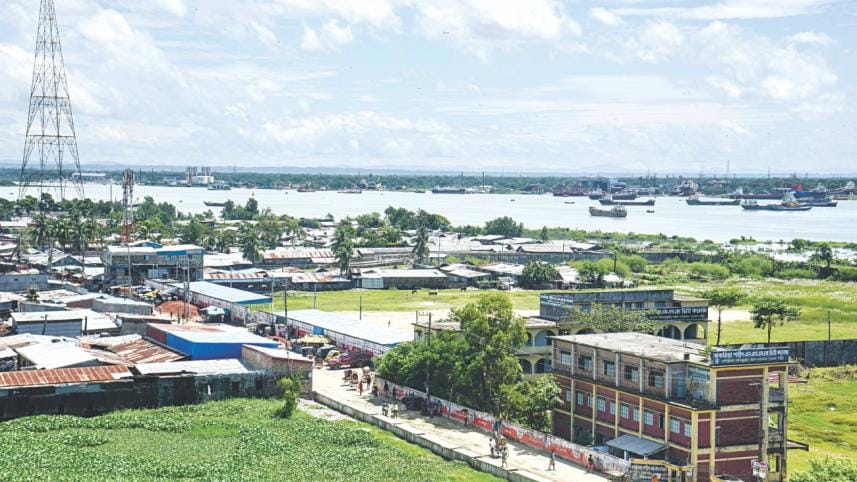Once a river ran thru' it

It's a bustling area with thousands of homes, shacks, and markets, farms, factories, brick kilns, and places of worship on the east and west of the roundabout of Shah Amanat Bridge at Bakolia of Chattogram city.
On a three-kilometre stretch of land, 30,000 people of mostly low-income group live in about 300 settlements.
And all of it is on at least 158 acres of the Karnaphuli river.
Ruling party men occupied part of the river and built slums, markets, fish farms, and to deter immediate government action, they set up various religious institutions, including mosques, temples, and monasteries, local sources say.

The settlements on the east of the roundabout are known by one name: Bastuhara Bahumukhi Samabaya Samiti, controlled by Nurul Amin Shanti, president of Boxirhat ward Awami League.
Another slum was built just a kilometre west of Bastuhara occupying the river at the confluence of Rajakhali and Chaktai canals.
The slum on the other side of the roundabout was built by Bhera Sramajibi Kalyan Samiti led by Akthar Hossen alias Kasai Akthar, vice-president of Jubo League of Boxirhat unit.
Sources in the ruling party said at least Tk 1 crore is realised as rent from the 300 settlements every month.
Settlements that accommodate a large number of people include Shanti colony, CNG plot colony, Islam Saudagar colony, Alam Kuti colony and Masjid colony.
A government report, prepared by the office of the deputy secretary Chattogram following a High Court order in 2016, blamed two key people for occupation of the Karnaphuli -- Nurul Amin Shanti and Jashim Uddin.
Jashim, who had grabbed most of the land, ran for city councillor as an independent candidate in 2014. Soon after his defeat in the polls, he lost his influence over Nurul and was forced to flee the slums.
Now, Nurul collects rent from the about 1,000 shanties Jashim used to “own”.
Akthar, president of Bhera Sramajibi Kalyan Samiti, told The Daily Star that they owned the land according to Revisional Survey and filed a case to get the Bangladesh Survey ledger amended as it records the property as the government land.
He also mentioned that they wrote to the Chattogram deputy secretary's office and the land ministry to get lease of the land.
Asked why they sought lease when they “own the land”, he walked off.
According to locals, Akthar occupied at least 10 acres in the name of Bhera Sramjibi Kalyan Samiti on the confluence of Chaktai and Rajakhali canals.
Nurul did not pick up The Daily Star's phone calls.
People living there told The Daily Star that they pay him between Tk 1,000 and Tk 3,000 a month as house rent. There are about 5,000 shanties built on occupied land in the area, they added.
“You can also buy a plot if you have the money. You can buy a katha of land here for Tk 2-3 lakh. As there are no genuine documents for these pieces of land, an agreement on a stamp paper is required to own land here,” said Nurun Nahar, a resident of the slum controlled by Bastuhara Bahumukhi Samabaya Samiti.
Another woman preferring anonymity told The Daily Star that the land was once part of the Karnaphuli. Leaders of the Samiti filled up the portion and turned into plots.
“Ten years ago, the land where we are standing now was the river,” she said.
Nazrul Islam Khan, general secretary of the Samiti, told this newspaper that the houses, markets, plots, graveyards, religious institutions have been built occupying the river.
“There were tributaries and canals here. … people filled it up with brick chunks and sand and the colonies were built,” he said.
A writ petition has been filed against an eviction order issued by the High Court in 2016, he said, adding that they were trying to lease the land from the government.
“If the government wants back its land, we must return it. We urge the government to relocate us somewhere else. If the Rohingyas can have a place in our country, why will we be deprived being citizens?”
The authorities cannot even stop fresh land grabbing, let alone reclaiming the occupied land on the both banks of the Karnaphuli.
Aliur Rahman, general secretary of Committee to Protect Chattogram's Canals and Rivers, said the more land surfaces on the Karnaphuli, the more illegal occupation takes place.
The grabbing became more severe after the HC ordered removal of 2,185 illegal structures on the river, he told this correspondent.
The office of the deputy secretary of Chattogram found 2,185 illegal structures on the banks of the Karnaphuli, according to a survey report in 2016.
Elias Hossen, deputy commissioner of Chattogram, told The Daily Star that they could not remove those structures identified as illegal due to fund crisis.
They wrote to the Ministry of Land thrice over the last two years asking for Tk 1.20 crore but are yet to get any response, he said.
“We published circulars in three local dailies asking the land grabbers to dismantle their structures.
“We are determined to launch an eviction drive as soon as possible with or without the fund.”

 For all latest news, follow The Daily Star's Google News channel.
For all latest news, follow The Daily Star's Google News channel.
Comments